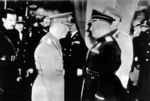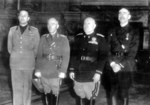Ion Antonescu
| Surname | Antonescu |
| Given Name | Ion |
| Born | 15 Jun 1882 |
| Died | 1 Jun 1946 |
| Country | Romania |
| Category | Government |
| Gender | Male |
Contributor: C. Peter Chen
ww2dbaseIon Victor Antonescu was born into a middle class family. He attended military schools in Craiova and Iaşi, Romania, and graduated the Cavalry School as top of class in 1904. In 1907, he took part in the peasants' revolt in the city of Galaţi. In 1911, he graduated from the military academy and was commissioned as an officer. In 1913, he was decorated during the Second Balkan War. Then, in WW1, he was Marshal Constantin Prezan's chief of staff and was vital in Romania's successful defense against German troops. After WW1, he was a military attaché in Paris and London. Returning to Romania in 1926, he very quickly gained more and more authority, being appointed by King Carol II to be the Defense Minister in 1937 then Prime Minister in Sep 1940. In an act out of his ambition, only two days after he became Prime Minister, he forced King Carol II off of the throne; Carol's son Mihai succeeded as king, but was largely a puppet of Antonescu's, who was named the Conducător of the nation.
ww2dbaseSurrounded by two foreign powers, Germany and Russia, Antonescu knew he had to make friends with one of the two in order to protect Romania. He chose Germany, hoping that by allying with the aggressively expanding nation would help him regain the territories lost to the Russians. Germany welcomed this friendship, knowing the Romania could supply her with oil that she badly needed to wage war. While forming alliances abroad, internally he formed a bond with the Iron Guard party, an organization that was actually undermining his own authority, in order to solidify his position. It turned out, however, that Antonescu could not control the Iron Guard party, and an unsuccessful rebellion broke out in Jan 1941.
ww2dbaseIn Jun 1941, when Adolf Hitler launched Operation Barbarossa against Russia, Antonescu sent troops to help as well. During this time Antonescu and German military commanders often met to discuss details of the campaign, and in this capacity he met with German Field Marshal Wilhelm Keitel. Keitel noted Antonescu as "a capable soldier, dedicated to his mission in life, open-hearted and forthright, but uncommunicative and often blunt." Keitel further noted that Antonescu was "incorruptible and a fine soldier, but he lacked the time to carry his reforms through." Together with the Germans, Romanian troops regained territories lost to Russia in 1940, and went deeper into Russian territory to capture the city of Odessa where a terrible massacre took place. For the Romanian assistance of the campaign, Antonescu was awarded the Knight's Cross by Hitler. However, the Romanians met fierce resistance from Russian forces near Stalingrad, and lost the momentum of the offensive. After the initiative was lost, his popularity suffered. On 12 Apr 1944, Russian troops neared the Romanian border and demanded surrender. Antonescu refused because he did not wish to become a traitor to his German allies. On 23 Aug 1944, King Mihai placed Antonescu under arrest and switched sides by joining the Allies and declared war on Germany.
ww2dbaseAfter the war, Antonescu was tried by the Russian-sponsored Bucharest People's Tribunal. He was found guilty for supporting the German invasion of Russia. He was executed on 1 Jun 1946, leaving a legacy of being the head of the Romanian government that killed between 280,000 to 380,000 Jews and 11,000 Roma people. Many post-war studies linked him directly to the anti-Semitic atrocities.
ww2dbaseSources: In the Service of the Reich, Wikipedia.
Last Major Revision: Apr 2006
Ion Antonescu Interactive Map
Photographs
 |  |
Ion Antonescu Timeline
| 15 Jun 1882 | Ion Antonescu was born. |
| 4 Sep 1940 | Romanian King Carol II handed power over to the pro-German General Ion Antonescu. |
| 5 Sep 1940 | Ion Antonescu became the Prime Minister of Romania and King Carol II transferred most of his dictatorial powers to him. |
| 2 Jan 1943 | Ion Antonescu of Romania met with Adolf Hitler to discuss the ensuing disaster in Stalingrad, Russia. |
| 17 Aug 1944 | Ion Antonescu signed an armistice with the anti-German opposition in Romania; this was viewed as an act of betrayal by the Germans. |
| 3 Sep 1944 | Ion Antonescu with his wife Maria, Mihai Antonescu, Kristia Pantasi, Konstantin Vasiliu, Eugen Kristesku, Gheorghe Alexianu, Radu Lekka, and other arrested Romanian leaders were placed aboard a special train for Moscow, Russia. |
| 9 Apr 1946 | Ion Antonescu, Mihai Antonescu, and Kristia Pantasi were returned to Romania for trial. |
| 1 Jun 1946 | Ion Antonescu was executed in Romania. |
Please consider supporting us on Patreon. Even $1 per month will go a long way! Thank you. Please help us spread the word: Stay updated with WW2DB: |

» Jassy-Kishinev Offensive and Romania's Surrender
- » 1,182 biographies
- » 337 events
- » 45,119 timeline entries
- » 1,249 ships
- » 350 aircraft models
- » 207 vehicle models
- » 376 weapon models
- » 123 historical documents
- » 261 facilities
- » 470 book reviews
- » 28,415 photos
- » 365 maps
George Patton, 31 May 1944